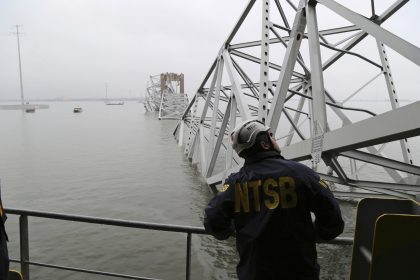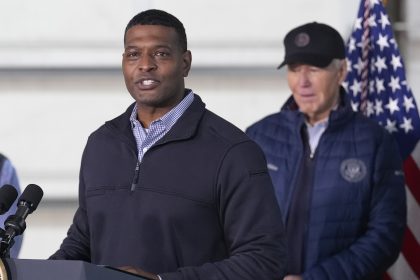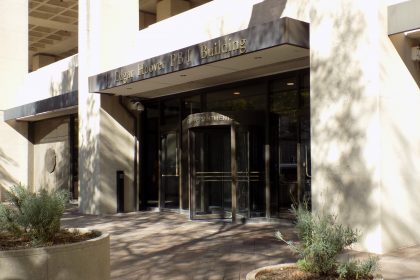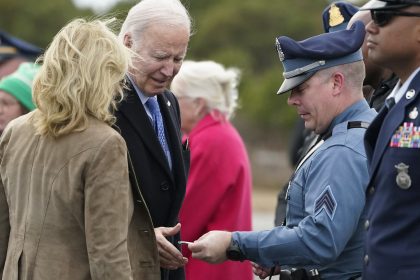Landrieu Evangelizes, Issues Call to Action on Infrastructure at NewDEAL Meeting
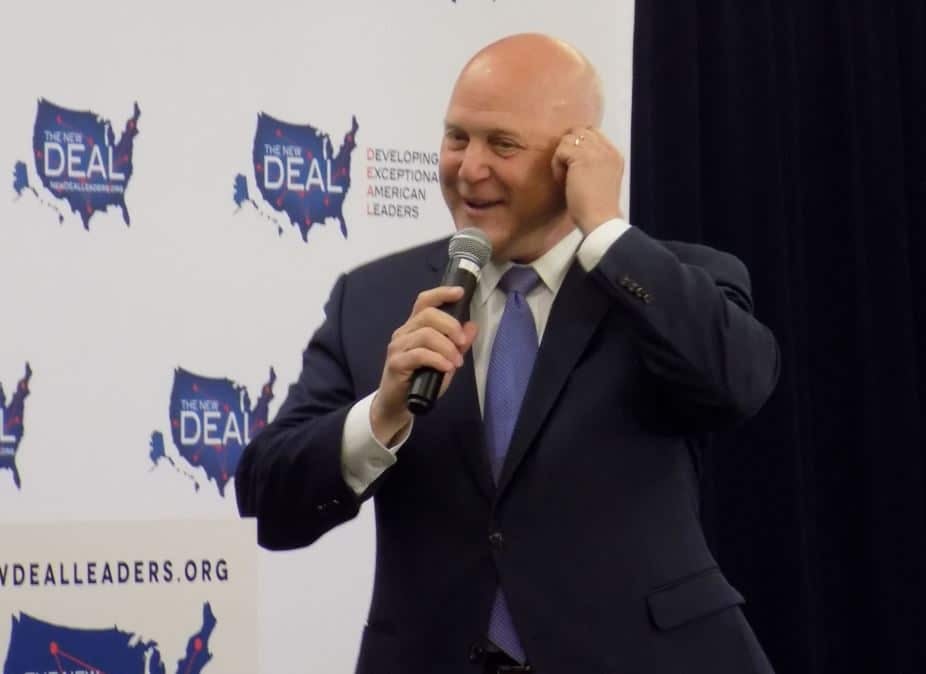
WASHINGTON — Mitch Landrieu could hardly contain himself as he waited to address the NewDEAL Leaders 12th annual conference last Friday.
Bouncing on his heels, the senior advisor to President Joe Biden and the man responsible for implementing the sweeping bipartisan infrastructure law, greeted a steady stream of well-wishers on the side of the room with a ready, mischievous smile and a handshake or embrace.
It was as if he was the eager candidate on the campaign trail, spoiling to get on stage and deliver what he knew would be a killer speech.
In fact, the only time the former lieutenant governor of Louisiana and former mayor of New Orleans appeared to stop stirring was when he was greeted by his sister Mary, a former U.S. senator from the state of Louisiana and a NewDEAL member.
After a hug, the two spoke quietly, practically forehead to forehead, like a boxer and his trainer moments before the bell would signal the start of the big fight.
Neither campaigning nor fighting, however, were what had Landrieu keyed up — it was his message, and knowing he was about to deliver it to a receptive audience.
But as he bounded onto the stage, greeting more old friends as he reached for the microphone, the athletically trim lifelong Democrat suddenly recalled a darker moment, involving his “slipping back home to New Orleans” to try to help rebuild a city devastated by Hurricane Katrina.
“I’m sure you all remember seeing your fellow Americans in that really difficult situation,” he said. “Scores of lives lost. A great American city under 17 feet of water. That storm basically destroyed everything. And we had to figure out a way to rebuild it.
“Thankfully, under President Obama’s leadership, after the 2008 election, and that of then-Vice President Joe Biden, a concerted effort was made to ensure that the people of New Orleans understood that in their darkest hour, the federal government was going to be there, through a commitment of funding and resources,” Landrieu said.
“And one of the things I learned in that moment was that when you have the federal government and the state government, the local government, the not-for-profits, the faith-based community and the business community coming together with a clear vision, you can actually get stuff done,” he said.
“You can rebuild a great American city,” he said, adding. “And if you can do that, you can rebuild the country.”
With that, Landrieu turned to the bipartisan infrastructure bill, a proposal that was still working its way across Capitol Hill when he received a somewhat cryptic phone call from President Biden.
“He said, ‘Hey, you want to come up here and help do this thing?’
“I said, ‘What thing?’
“‘The infrastructure bill,’ the president replied.
“‘Well, what do you mean?’
“‘Well, I mean, like the whole thing.’
“So, of course I said, ‘Yes, sir,’” Landrieu said. “And over the past year, it has been an incredible ride.”
According to the presidential adviser, there are three things that still need to happen for the bipartisan infrastructure legislation to achieve all of the goals the administration has for it.
“The first one is, we have to build a team, and you are all part of that,” he said to the gathering of state and local officials.
“Second, you have to get money out the door, and the third thing is we have to tell the American people about it, so they understand how you actually build a better America — because that’s what the president promised us,” he said.
As Landrieu continued to evangelize from the stage, he wove a verbal tapestry that not only included the infrastructure bill, but also the Biden administration’s American Rescue Plan and the Inflation Reduction Act.
“Think about a bucket load of money coming from the federal government that is steadily designed to rebuild the economy from the bottom up and the middle out … think about, arguably, the most significant piece of domestic legislation passed in the last 50 years,” he said. “These are investments that we haven’t seen since FDR, since Eisenhower … and it is a massive, wonderful opportunity to build what the president says is a better America.”
Talking about “his piece,” infrastructure, Landrieu said the bill is “way more” than a $2 trillion investment in long overdue projects.
“It’s an effort extending across 14 different departments, aimed at rebuilding roads, bridges, airports and waterways — and also expanding access to high-speed internet,” he said.
“And think about that last piece alone. None of us can operate in the world without access to high-speed internet,” Landrieu said. “But all across America, people don’t have access to the future because they don’t have access to the knowledge high-speed internet can place at their fingertips — knowledge is the great equalizer. And the president and vice president want to level the playing field in the not-too-distant future.”
Landrieu went on to explain that a significant portion of bipartisan infrastructure bill spending will go toward cleaning up Superfund and brownfield sites, “because some failed to learn from their mom that you’re supposed to clean up what you mess up.”
“And then, there’s the most futuristic part of the bill, which is creating a whole new clean energy economy,” he said.
“Now, some might ask, ‘How has this gone so far?’ And what I would say in answer is, there’s no turning back on this,” Landreiu continued. “You can see this with the electrification of vehicles. Every major auto manufacturer has now predicted that in the not-too-distant future everybody is going to be driving a battery-operated car.
“The thing is, we have to get there from here,” he said. “And what we’ve seen is every one of these auto manufacturers making major new investments in line with that vision. We’ve seen every state put together a plan to create, in total, 500,000 new EV charging stations.
“And it’s like House Speaker Nancy Pelosi, D-Calif., said not long ago, ‘Even those who voted no, want the dough.’”
Landrieu said in the interest of the progress already being made, governors across the country are appointing “infrastructure coordinators” to interact with their federal counterparts, but more needs to be done, especially on the city and local government level.
“That’s because the money gets to the ground in two ways,” he explained. “One, a portion goes straight to the states and states spend it on projects and initiatives depending on their own longstanding funding processes.
“The other piece is competitive money, which is critically important because even when you’re talking about spending billions of dollars, there’s still not enough money for everybody to have everything they want. We’ve got 7,000 projects that are in the germination phase right now.
“So how do we get from where we are now to where we need to be?” Landrieu asked. “The first thing is to get away from the time-worn idea of rebuilding.
“When Katrina destroyed New Orleans, we took it as a wake-up call to do things better this time around. To make everything like it was yesterday is a mistake. Tragic events give you an opportunity to look inside yourself and ask, ‘Well, was this thing I’m really missing now, perfect?’ And the answer is no.
“The next question is: What does a better America really look like? And then if we can answer that, the next question is: How do we get there? And of course, this is all being driven by the question: So now that we have one more chance to do it right, don’t you think that we should?”
Landrieu said while some suggest the best way to kick-start the economy is to introduce tax cuts to the top 1% of earners and have the “benefits” trickle down to the rest of the economy, the president doesn’t think that works.
“The president believes a better America looks like America when we think about equity — and equity is very broadly defined,” he said.
“It’s not just about race. It’s about geography. It’s about historic poverty. It’s about making sure that everybody in the country, in urban areas and rural areas, in tribal areas, actually have a shot, a reasonable shot — through technical assistance, workforce development — to actually be able to participate in the competition, and win.”
Landrieu said the climate crisis is also dictating the terms of a better America in that it’s revealing important shortcomings in how infrastructure was planned and built in the past.
“You don’t build bridges back to the way they were before you got whacked by a major, climate change-fueled weather event, you build them higher. You respond to your threats. So this time around, you build with climate change in mind, and also while thinking about things like cybersecurity as well, because you know that that’s going to be a threat.”
Landrieu’s other prescription for building back better is using products that are American made.
“We want to make sure that the wealth we’ve generated in this country is invested in starting to build things here — that’s what the CHIP’s program is all about. When you think about building a world around all these component parts — equity, addressing climate change, buying made in America raw materials, and the really good paying jobs that come along with these things, you’re talking about building a much stronger foundation so that America can actually thrive in the 21st century.
“That’s the exercise we’re engaged in right now, but we can’t do this alone,” Landrieu told the NewDEAL’s membership. “The elbow grease, the actual hard work, is going to happen at the state and local levels, and it’s the people in this room, you are going to execute the vision to build a better America.”
Dan can be reached at [email protected] and @DanMcCue

















